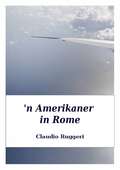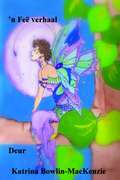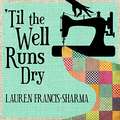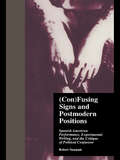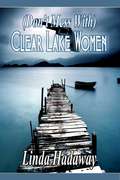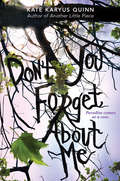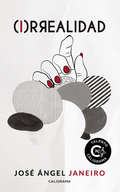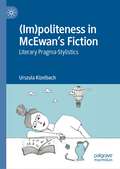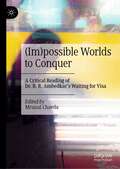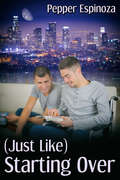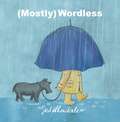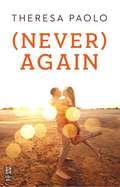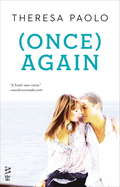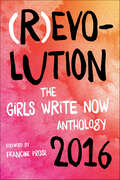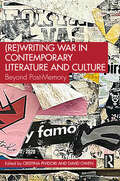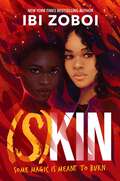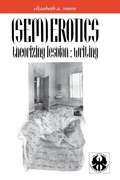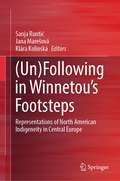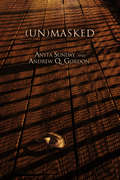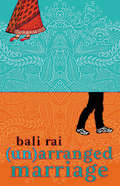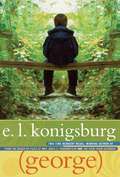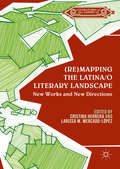- Table View
- List View
'n Amerikaner in Rome
by Claudio RuggeriDie lewe is gemaak vir ontmoetings, in hierdie boek word daar van een so ontmoeting vertel. Dit is 'n eenvoudige storie, een wat tydens 'n somermiddag oor die tafels van 'n kroeg gehoor kan word
'n Feë verhaal
by Katrina Bowlin-Mackenzie Liezl Dreyer'n Skaam meisie sit alleen met feëtjies as haar enigste vriende, todat hulle haar leer om te glo in haarself. Baie kleur en lewendig.
'n Kristal Engel
by Dawn Brower’n Dronk belofte van verlowing het Thor se familie teen hom gedraai. Sal Thor Pia se vergifnis verdien en hulle weghardlopende kinders betyds vir Kersfees vind? Na 'n nag van kaarte en drinkery, was Thor se skeurende hoofpyn die minste van sy bekommernisse. Wanneer 'n boodskapper opdaag met 'n kontrak vir hom om te teken, ontdek sy vrou Pia hy het ingestem om hulle seun aan die graaf van Devon se dogter te verloof. Pia is verby woedend en eis dat hy dit regmaak—of anders. Nadat hulle die argument tussen hulle ouers gehoor het, besluit die tweeling Liam en Lily om weg te hardloop uit protes teen die kontrak. Thor en Pia gaan op soek na hulle opstandige kinders voordat iets verskrikliks met hulle gebeur. Sal Thor Pia oortuig om hom te vergewe en die tweeling voor Kersfees te vind, of sal hulle gesin vir altyd uitmekaar val?
'til The Well Runs Dry: A Novel
by Lauren Francis-SharmaLauren Francis-Sharma's 'Til the Well Runs Dry opens in a seaside village in the north of Trinidad where young Marcia Garcia, a gifted and smart-mouthed 16-year-old seamstress, lives alone, raising two small boys and guarding a family secret. When she meets Farouk Karam, an ambitious young policeman, the risks and rewards in Marcia's life amplify forever. On an island rich with laughter, Calypso, Carnival, cricket, beaches and salty air, sweet fruits and spicy stews, the novel follows Marcia and Farouk from their amusing and passionate courtship through personal and historical events that threaten Marcia's secret, entangle the couple and their children in a scandal, and endanger the future for all of them. 'Til the Well Runs Dry tells the twinned stories of a spirited woman's love for one man and her bottomless devotion to her children. For listeners who cherish the previously untold stories of women's lives, here is a story of grit and imperfection and love that has not been told before.
(Con)Fusing Signs and Postmodern Positions: Spanish American Performance, Experimental Writing, and the Critique of Political Confusion
by Robert NeustadtFirst Published in 1999. Routledge is an imprint of Taylor & Francis, an informa company.
(Don't Mess With) Clear Lake Women
by Linda Hadaway(Don't Mess With) Clear Lake Women.....is a novel about four women. Their bond of family and friendship is tightly woven. They don't take friendship flippantly, or loyalty; neither do they take betrayal lightly, or harm to a loved one. It's about their hopes, and dreams, the relationships they are involved in, and ... hidden secrets of the past. Madison Manning- independent. She struggles with her Obsessive-Compulsive Disorder and insecurities about a long lasting relationship. She is the anchor for her friends. Roxy Hunter- strives to be her own woman. Dealing with a self-absorbed mother and an abusive uncle who is dying, Roxy is thankful for her close friends. Love? She is sure it won't happen to her. Jacki Blake- self-reliant; runs her own landscaping business. The only gay woman in the group. She too, would like to find true love, however fears commitment. Sunday Nelson - married to an abusive husband, Duffy. The abuse is growing more severe. Within the story, she carefully begins to form a plan to leave him. Can she do it- and live?
(Don't You) Forget About Me
by Kate Karyus QuinnStephen King meets Tuck Everlasting in this eerie, compulsively page-turning tale of a girl haunted by the loss of her sister--and trapped by the mysterious power that fuels her small town.Gardnerville seems like a paradise. But every four years, a strange madness compels the town's teenagers to commit terrible crimes. Four years ago, Skylar's sister, Piper, led her classmates on a midnight death march into a watery grave. Now Piper is gone. And to get her back, Skylar must find a way to end Gardnerville's murderous cycle.From Kate Karyus Quinn, author of Another Little Piece, comes a mesmerizing and suspenseful novel that will thrill fans of Maggie Stiefvater's The Raven Boys and Brenna Yovanoff's The Replacement.
(I)rrealidad
by José JaneiroUna búsqueda a través de la poesía. (I)rrealidad es parte de un pequeño apartamento en el corazón de la megalópolis. Allí, solo con mi hija, rodeado de libros, de pinturas, de abrazos, de sonrisas, de sueños -sobre todo, de sueños-, fueron gestándose cada uno de los poemas. (I)rrealidad es fruto del amor más profundo, del anhelo de paz, de justicia. Es el camino que falta para volver a ser niño, el orgullo de impertenencia, el ansia de libertad. (I)rrealidad es un mundo detrás de un mundo, es un crisol de palabras, es un deseo de verdad, de belleza, de vida.
(Im)politeness in McEwan’s Fiction: Literary Pragma-Stylistics
by Urszula KizelbachThis book is a pragma-stylistic study of Ian McEwan’s fiction, providing a qualitative analysis of his selected novels using (im)politeness theory. (Im)politeness is investigated on two levels of analysis: the level of the plot and the story world (intradiegetic level) and the level of the communication between the implied author and implied reader in fiction (extradiegetic level). The pragmatic theory of (im)politeness serves the aim of internal characterisation and helps readers to better understand and explain the characters’ motivations and actions, based on the stylistic analysis of their speech and thoughts and point of view. More importantly, the book introduces the notion of “the impoliteness of the literary fiction” – a state of affairs where the implied author (or narrator) expresses their impolite beliefs to the reader through the text, which has face-threatening consequences for the audience, e.g. moral shock or disgust, dissociation from the protagonist, feeling hurt or ‘put out’. Extradiegetic impoliteness, one of the key characteristics of McEwan’s fiction, offers an alternative to the literary concept of “a secret communion of the author and reader” (Booth 1961), describing an ideal connection, or good rapport, between these two participants of fictional communication. This book aims to unite literary scholars and linguists in the debate on the benefits of combining pragmatics and stylistics in literary analysis, and it will be of interest to a wide audience in both fields.
(Im)possible Worlds to Conquer: A Critical Reading of Dr. B. R. Ambedkar’s Waiting for Visa
by Mrunal ChavdaWith multidisciplinary examination, this book explores Waiting for Visa, Ambedkar's autobiographical writing. This investigation ranges from Dalit Studies to Discourse analysis. It aims to provide the reader with in-depth knowledge of Ambedkar's unexplored autobiographical memoir and supplement a range of generalized works. The issues addressed in this book are essential to Ethnic and Race studies in general, to which Dalit Studies is but one contributing discipline. The Dalit Studies already have many texts. These texts are primarily concerned with Dalit identity politics, socio-mythological explorations, and Ambedkarian thoughts on economics, politics, and racial-religious discriminations. These are not discussed with Ambedkar's life stories narrated by himself. This book bridges the gap between Dalit Studies and Ambedkar Studies to project how Ambedkar attempted to forge into an impregnable South Asian social, educational, and political fabric. This reference book aims to attract academics and students of Asian, South Asian, and Dalit Studies. The book appeals to educators, policymakers, and comparative literary scholars.
(Just Like) Starting Over
by Pepper EspinozaAfter a horrible car accident, Guillermo “Guy” Rivera doesn’t even remember who he is. Suffering from amnesia, bound to a wheelchair with a broken arm and a broken leg, he relies on his in-home caregiver, Dane Mathis, to help him with everything from bathing to eating. Guy wants Dane to be more than just a caregiver, but Dane keeps his distance.Six months after their relationship ended, Dane Mathis drops everything to help Guy put his life back together. It’s difficult to treat Guy like a stranger, but he knows he must not give in to his deep desires. He won’t risk Guy’s anger by revealing the true nature of their relationship. Or the reality of their past together.Even so, Dane can’t help but hope this is their second chance at love ...
(Mostly) Wordless
by Jed AlexanderAs its title suggests, (Mostly) Wordless is a mostly wordless all-ages book filled with stories, short vignettes and character sketches told with either no, or few words. <P><P>The book begins with the wordless mini-epic, “Ella and The Pirates,” an enchanting tale about a little girl and her imaginary adventures as a pirate as she sails through perilous waters, has sword fights and discovers buried treasure. This continually surprising and engaging book rewards repeat readings, with something new to discover on every page. For young readers and non-readers alike!
(Never) Again
by Theresa PaoloJust when she had finally moved on... ...He moved back. When college freshman Liz Wagner hears her ex's voice for the first time since he moved clear across the freaking country, she does what any respectable girl would do: Dive into the girls' bathroom. Zach Roberts--the Zach Roberts--is back. And he's everywhere Liz looks--infiltrating her friend group, buddy-buddy with her brother. It's enough to ruin college altogether. But what choice does she have but to put on a happy face and pretend he didn't leave her vulnerable and alone in a pile of emotional wreckage? Pretending works, until tragedy strikes and the only person available for comfort is the one person she wants to stay away from. When Zach turns out not to be the jerk she convinced herself he was, but the boy she used to love, Liz needs to decide whether to open her heart again to the boy who tore it out.
(Once) Again
by Theresa PaoloJosh will have to reconcile his past... In order to make Kat his future. After surviving a real-life nightmare, Josh Wagner is sent home from his dream college on crutches. Bedridden and tormented by flashbacks, he's just seen his world shattered and his baseball scholarship go up in smoke. Josh's family hires a health aide to help take care of him, but when he opens the door, the last person he expects to see is his biggest regret... Katherine Singleton is the only girl Josh has ever loved. Now, even though she's only taking care of him because it's her job, Josh is determined to win her back. But Kat had to move on after their breakup two years ago, and despite her feelings for Josh, a lot has happened since he left... When Kat's past comes back to haunt her, Josh decides it's his turn to take care of her. But protecting her--and redeeming himself--will put Josh in the line of fire again. Will he survive this time? Includes a sampler of (Never) Again Praise for (Never) Again "A sweet, romantic tale about reconnecting with the one that got away."--LeAnn's Book Reviews "A fresh new voice."--wondrousreads.com "A beautiful, light, fun love story with a dose of drama . . . leaves you with a satisfied smile when you read that last page."--Cassie Mae, author of How to Date a Nerd "Made me remember how fantastic it is to surrender to your heart and fall in love."--Lizzy Charles, author of Effortless with You Theresa Paolo lives in the same town she grew up in on Long Island, NY with her boyfriend and Milton, their big eyed goldfish. She has a hard time accepting the fact she's nearing thirty which is why she writes new adult and young adult books, reliving the best and worst years of her life through her characters. She put her love of writing on hold while she received her bachelor's degree in marketing from Dowling College. When she's not writing, she's behind a camera or can be found in the blogosphere or on Twitter, Pinterest and Facebook.
(R)evolution: The Girls Write Now 2016 Anthology
by Francine ProseFrom one of top after-school programs in the nation, Girls Write Now, comes the next installment in the organization’s award-winning anthology series: a stunning collection of poetry and prose written by young women and their mentors in exploration of the theme of “Revolution.” Distinguished twice by the White House as one of the nation’s best after-school arts and cultural organizations, and recently honored by Newsweek in an article on after-school programs that make a difference, Girls Write Now works to empower underserved teen girls in New York City by pairing them with professional women writers who serve as their personal mentors. (R)evolution showcases the best poetry, prose, and essays from the mentees and mentors of Girls Write Now on the theme of “Revolution,” and includes a bonus section of writing exercises and prompts for individuals and groups. Powerful and inspiring, (R)evolution showcases the brave new voices that are changing the world of literature, one girl at a time.
(Re)Writing War in Contemporary Literature and Culture: Beyond Post-Memory
by Cristina Pividori and David Owen(Re)Writing War in Contemporary Literature and Culture: Beyond Post-Memory is an exploration of war narratives through the lens of postmemory, offering a critical re-evaluation of how contemporary literature and cultural products reshape our understanding of past conflicts. This volume presents a rich tapestry of perspectives, drawing from an array of conflicts and incorporating insights from international experts across various disciplines, including contemporary literature, film studies, visual arts, and cultural studies. It critically builds upon and extends Marianne Hirsch's concept of postmemory, engaging with complex themes like the ethical dimensions of war writing, the authenticity of representations, and the creative power of art in reimagining traumatic events. This study not only challenges traditional boundaries in war literature and memory studies but also resonates with contemporary concerns about societal engagement with violent pasts, making it a significant addition to scholarly discourse and essential reading for those interested in the intersection of history, memory, and literature.
(S)Kin
by Ibi ZoboiSIX STARRED REVIEWS!A Junior Library Guild Gold Standard Selection!From award-winning, New York Times bestselling author Ibi Zoboi comes her groundbreaking contemporary fantasy debut—a novel in verse based on Caribbean folklore—about the power of inherited magic and the price we must pay to live the life we yearn for.“Our new home with itsthick walls and locked doorswants me to stay trapped in my skin—but I am fury and flame.”Fifteen-year-old Marisol is the daughter of a soucouyant. Every new moon, she sheds her skin like the many women before her, shifting into a fireball witch who must fly into the night and slowly sip from the lives of others to sustain her own. But Brooklyn is no place for fireball witches with all its bright lights, shut windows, and bolt-locked doors.… While Marisol hoped they would leave their old traditions behind when they emigrated from the islands, she knows this will never happen while she remains ensnared by the one person who keeps her chained to her magical past—her mother.Seventeen-year-old Genevieve is the daughter of a college professor and a newly minted older half sister of twins. Her worsening skin condition and the babies’ constant wailing keep her up at night, when she stares at the dark sky with a deep longing to inhale it all. She hopes to quench the hunger that gnaws at her, one that seems to reach for some memory of her estranged mother. When a new nanny arrives to help with the twins, a family secret connecting her to Marisol is revealed, and Gen begins to find answers to questions she hasn’t even thought to ask.But the girls soon discover that the very skin keeping their flames locked beneath the surface may be more explosive to the relationships around them than any ancient magic.
(Sem)Erotics: Writing
by Elizabeth MeeseWhat is at stake in the production of experimental texts by lesbian writers? what motivates these writers and characterizes their work? In this work, Elizabeth Meese examines the ways in which the experiences of the text, and the experiences of character, diverge and converge wit the writer's own biography.
(Un)Following in Winnetou’s Footsteps: Representations of North American Indigeneity in Central Europe
by Sanja Runtić Jana Marešová Klára KolinskáThis book examines the ways in which North American Indigenous identity has been (re)imagined, represented, and negotiated in German, Croatian, Italian, Polish, and Czech culture. Employing a cross-disciplinary and comparative approach and drawing on a range of media—from literature, comics, and film to photography, painting, and the performative arts—across different historical and cultural backgrounds, it aims to both contribute innovative scholarship on Indigenous studies in Europe and open a new avenue in the field by focusing on Central European settings that have received little or no critical attention to date. The book’s novelty also comes from its focus on the latest developments in the field, including the “Ravensburger/Winnetou controversy,” which swept across Europe in 2022, echoing the 2017 Canadian debate over Indigenous appropriation and free speech. It seeks to provide a sound reference and lay the groundwork for future scholarship by opening up a conversation on how Indigenous identities have been portrayed in Central European literature and media texts. To this end, it not only addresses generalized expectations about North American Indigenous people underlying (Central) European public discourse and imagination but also questions whether and to what extent some of the ingrained stereotypical views and practices, such as hobbyism, have been challenged in the face of Indigenous resurgence, rapidly changing media and information-sharing realities, and global cultural shifts. The closing interview with Métis playwright, actor, and director Bruce Sinclair underscores one of the book’s key goals—to spark an informed cross-cultural dialogue that will reveal the mechanisms of, as well as the contradictions and tensions inherent in, the politics of Indigenous representation in (Central) European cultural industries and encourage (Central) Europeans to confront their own cultural assumptions and attitudes.
(Un)Masked
by Caroline Wimmer Andrew Q. Gordon Anyta SundayJay Walker has two wishes: to perform the play of his dreams alongside his best friend at Wellington's Tory Street Theatre, and to meet that special someone. Someone he'd go to the ends of the earth for. Someone who might only exist in fairy tales. When Jay meets accordion busker Lethe Cross, it's like living a dream come true. Lethe's music captivates Jay, and he resolves to meet the man who plays so beautifully. But then he discovers Lethe's life is more like a nightmare. The phrase "down on his luck" can't begin to cover it. Determined to help, Jay does some snooping for answers--and winds up on the wrong end of a centuries-old curse. The good news is there's a way to break it. The bad news is it might cost Jay his life.
(Un)arranged Marriage
by Bali RaiMANNY WANTS TO BE A FOOTBALLER. OR A POP STAR. OR WRITE A BESTSELLER. HE DOESN'T WANT TO GET MARRIED...'Harry and Ranjit were waiting for me - waiting to take me to Derby, to a wedding. My wedding. A wedding that I hadn't asked for, that I didn't want. To a girl who I didn't know... If they had bothered to open their eyes, they would have seen me: seventeen, angry, upset but determined - determined to do my own thing, to choose my own path in life...'Set partly in the UK and partly in the Punjab region of India, this is a fresh, bitingly perceptive and totally up-to-the-minute look at one young man's fight to free himself from family expectations and to be himself, free to dance to his own tune.
(Woman) Writer: Occasions and Opportunities
by Joyce Carol OatesThese are essays on somewhat general subjects such as the creative impulse, what it means to be a woman writer though the imagination is genderless, and the abundance of "wonderlands" in our culture and invigorating re-explorations of individual writers such as Melville, Emily Dickinson, Charlotte Bronte, R. L. Stevenson and Hemingway.
(george)
by E. L. KonigsburgOnly Howard Carr and his older brother, Ben, can answer that question, because only they know about George. George is the funny little man who lives inside Ben, helping him (mostly) navigate life as a sixth grader who happens to be a scientific genius and who happens to be studying organic chemistry with students much older than he. One of those students is William Hazlitt, a senior who has been Ben's lab partner in previous years. William's interest in chemistry has taken a troubling turn, and Ben has a plan to come to his rescue. And that's when things get complicated -- for Howard, for Ben, and for George.
* - 0 - #
by William EarleRoland Howard finally shares a secret he's kept for four months with his best friend, Seth Martin - the discovery of time travel! Now, the two must work together and work fast to share the secret with someone who could develop it successfully for them and for the world. But, are they the only two in the world to know about it?
**Missing** (Literatures of the Americas)
by Cristina Herrera Larissa M. Mercado-LópezThis book broadens the scope of Latina/o criticism to include both widely-read and understudied nineteenth through twenty-first century fictional works that engage in critical discussions of gender, race, sexuality, and identity. The essays in this collection do not simply seek inclusion for the texts they critically discuss, but suggest that we more thoughtfully consider the utility of mapping, whether we are mapping land, borders, time, migration, or connections and disconnections across time and space. Using new and rigorous methodological approaches to reading Latina/o literature, contributors reveal a varied and textured landscape, challenging us to reconsider the process and influence of literary production across borders.
